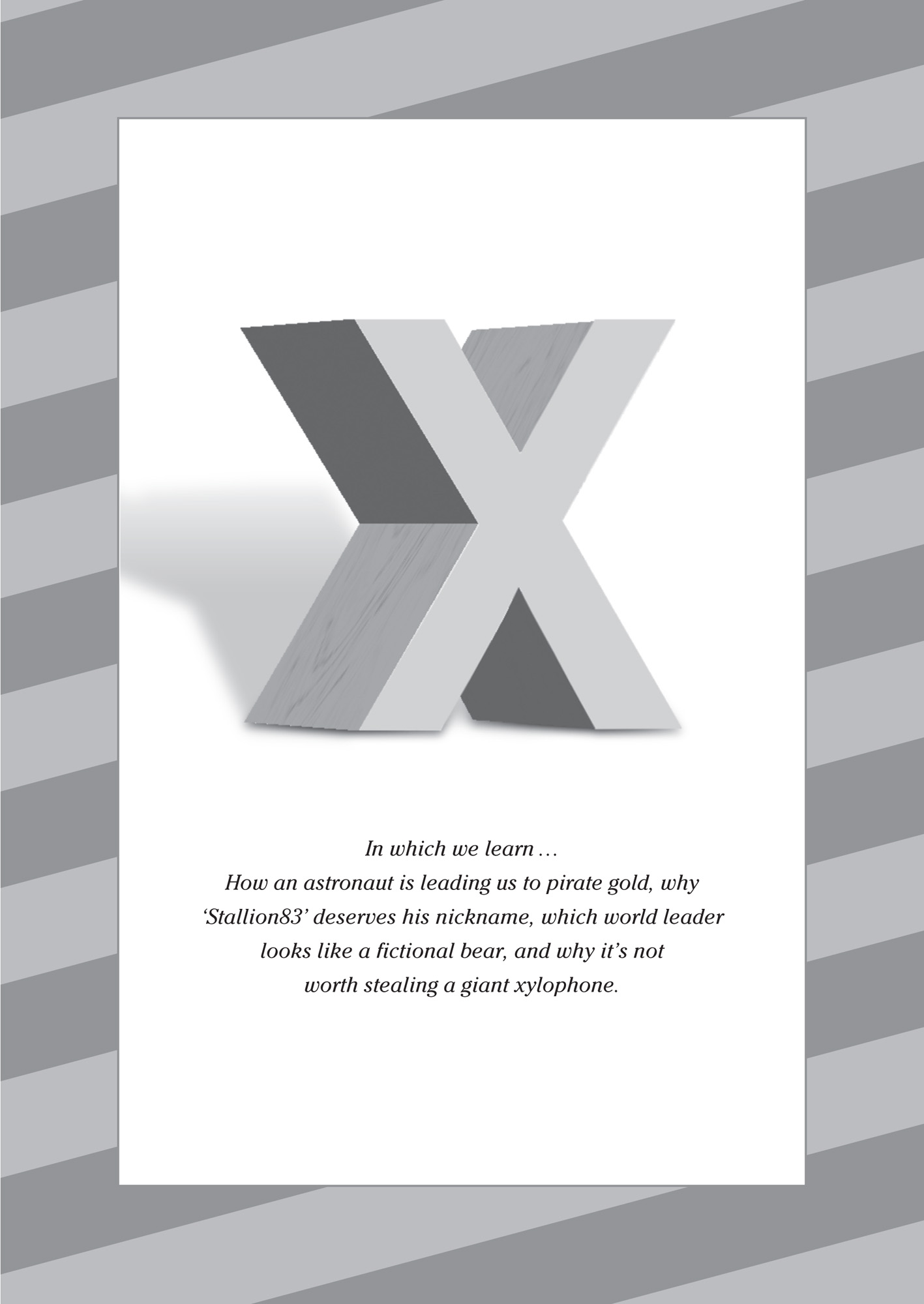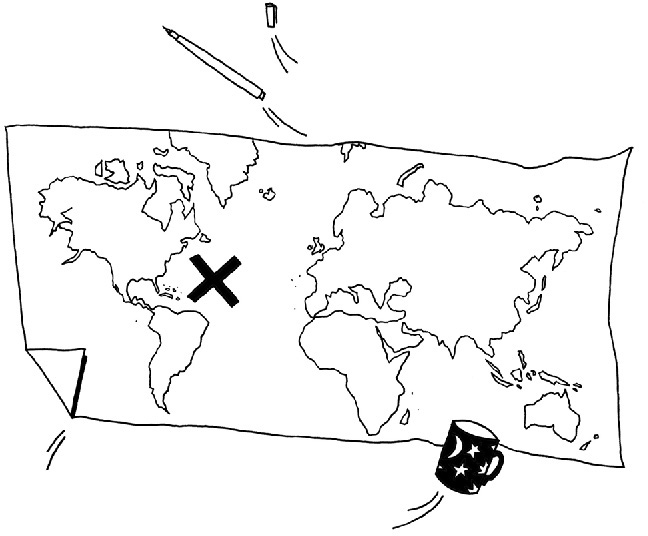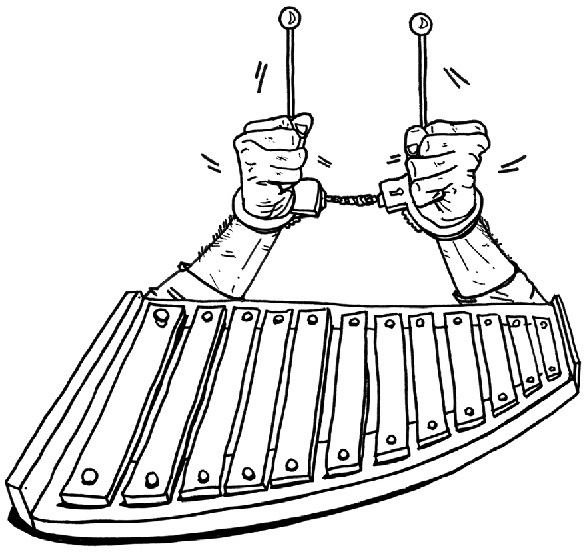

X MARKS THE SPOT▶
A man looked for sunken gold using a treasure map made in space.
In 1963, Gordon Cooper, the first astronaut to pilot a solo space mission,* was aboard his spacecraft, looking for nuclear sites by monitoring magnetic signals on Earth. He kept getting anomalous readings from under the sea in the Caribbean, and concluded they must be caused by sunken Spanish treasure from the golden age of piracy. So, as he orbited the Earth 22 times, he made a map of where they were. He didn’t tell anyone until just before he died in 2004, when he shared the map with his treasure-hunter friend Darrell Miklos. Miklos went looking for the treasure this year and has so far found nothing but an anchor that may, or may not, be from one of Columbus’s ships.

Back on dry land, police urged art dealer Forrest Fenn to call off the hunt for his buried treasure after a second person died searching for it. Seven years ago, Fenn hid a chest full of gold nuggets, jewels and gemstones, now worth about $2 million, somewhere in the Rocky Mountains and wrote a cryptic poem that he says provides the clues for where to find it. Many have tried, but no one has yet succeeded in solving his riddles. Colorado pastor Paris Wallace died this year as he braved the difficult terrain looking for the chest and so police have advised people to stop looking for the booty. Wallace’s wife (a fellow treasure hunter) disagrees, and believes the search should continue.
One man who wasn’t searching for gold but got lucky anyway was piano tuner Martin Backhouse. He can now retire early because he found £500,000 worth of loot inside a piano. This is particularly fortunate as he recently developed tinnitus, making it hard for him to work. The piano belonged to a couple who had owned it since 1983, before donating it to the local college last year. They never realised it contained a hoard of 19th- and early-20th century gold coins wrapped in some old Shredded Wheat packaging until the college employed Backhouse to tune it. He initially mistook the treasure for moth repellent.
XBOX▶
Stallion83, who held the Xbox scoring record for 11 years, was knocked off the top spot because he was too busy having sex.
All users of Xbox products can accumulate points by completing certain tasks in their games. This gives them a ‘Gamerscore’, which indicates more about their devotion to playing games in general than it necessarily does about their skills at a particular game.
The most devoted gamer of all time is undoubtedly Ray ‘Stallion83’ Cox, who has had the top Gamerscore for 11 years. But this year, because he got married and went on honeymoon, he was away from his console for long enough to be overtaken by another player: Stephen ‘smrnov’ Rowe.
After returning from honeymoon, Stallion83 worked to get back to the top, and after a few weeks of dedicated gaming he did so, reaching 1.6 million points before tweeting: ‘Now back to having all the sex.’
XI JINPING▶
Winnie-the-Pooh was censored in China because he looks too similar to Xi Jinping.
Memes noting the physical similarities between the Chinese premier and honey-obsessed bear first spread across social media in 2013. In 2015, the most censored image in China was one of Xi standing up in a car with his head through the sunroof, alongside Pooh in his own toy car. Now, Chinese social media users are having problems making any reference to Pooh on the Internet. Posts that mentioned him on Weibo, China’s equivalent of Twitter, were suddenly forbidden, and gifs of the bear disappeared from the messaging forum WeChat. The government hasn’t confirmed the reason for the ban, but we know that Xi hasn’t taken kindly to humorous comparisons in the past: online references to the Chinese food staple, steamed buns (baozi), were censored because they’ve been used as a nickname for Xi ever since he was photographed eating one in 2014.
The letters ‘RIP’ were also blocked on social media in China in July, after the death of famous government critic and Nobel Peace Prize winner Liu Xiaobo. Weibo banned anyone not only from posting ‘RIP’, but also the word ‘Nobel’ or the candle emoji.
Xi Jinping also hit the headlines in April when he met Donald Trump. Afterwards Trump said that until the two of them had spoken, he’d assumed that China could easily deal with the threat of North Korea. However, Xi had explained the background of relations between China and North Korea to him: ‘After listening for ten minutes, I realised it’s not so easy,’ Trump said.
XYLOPHONES▶
In excellent news for writers of A–Z current affairs books, there was some xylophone news.
A man in Virginia was arrested for stealing a 1.5-metre xylophone from a children’s playground. The instrument was bolted to the ground, but as it was worth a remarkable $4,000 it’s not too surprising that it was pinched. However, it must have been quite hard to find a buyer on the black market: when the police found the perpetrator, a week later, he still had the xylophone in his possession.
Astonishingly, this wasn’t the only xylophone crime in the US this year. A woman from Florida was arrested for attacking a man who wouldn’t stop playing a xylophone. The lady told police that she had asked him to stop. When he refused she ‘dumped a pot of cold cooking grease on him’.
